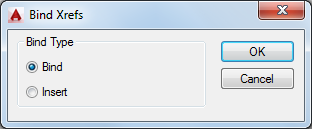Converts DWG references (xrefs) and DGN Underlays to standard local block definitions.

If you bind an xref into the current drawing, the xref and all its dependent named objects become a part of the current drawing. Use XBIND to add individual xref-dependent named objects, such as blocks, text styles, dimension styles, layers, and linetypes, to the local definition table. The two methods of binding xrefs to the current drawing are Bind and Insert. Bind alters the definition table names of an xref when it is inserted. Insert does not alter the definition table names of an xref when it is inserted. To bind a nested xref, you must also select the parent xref.
List of Options
The following options are displayed.
- Bind
-
Binds the selected DWG reference to the current drawing. Xref-dependent named objects are changed from blockname|definitionname to blockname$n$definitionname syntax. In this manner, unique named objects are created for all xref-dependent definition tables bound to the current drawing.
For example, if you have an xref named FLOOR1 containing a layer named WALL, after binding the xref, the xref-dependent layer FLOOR1|WALL becomes a locally defined layer named FLOOR1$0$WALL. The number in $n$ is automatically increased if a local named object with the same name already exists. In this example, if FLOOR1$0$WALL already existed in the drawing, the xref-dependent layer FLOOR1|WALL would be renamed FLOOR1$1$WALL.
- Insert
-
Binds the DWG reference to the current drawing in a way similar to detaching and inserting the reference drawing. Rather than being renamed using blockname$n$definitionname syntax, xref-dependent named objects are stripped of the xref name. As with inserting drawings, no name-incrementing occurs if a local named object shares the same name as a bound xref-dependent named object. The bound xref-dependent named object assumes the properties of the locally defined named object.
For example, if you have an xref named FLOOR1 containing a layer named WALL, after binding with the Insert option, the xref-dependent layer FLOOR1|WALL becomes the locally defined layer WALL.